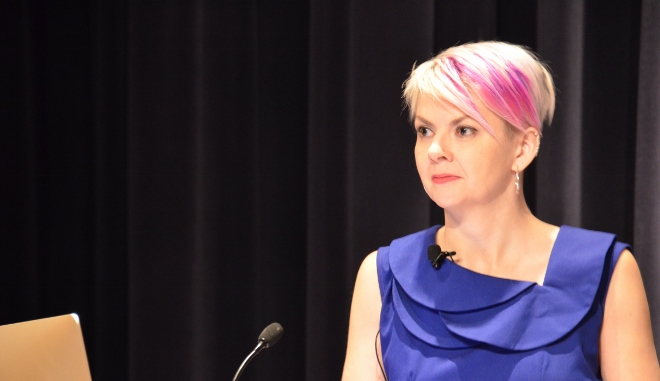
Deanna Zandt, media consultant, social change activist and Internet virtuoso, presented ways to use social media to establish “emotional resonance” Wednesday night in the McCormick Tribune Center.
In order to establish that emotional resonance with her audience, she offered a quote from American entrepreneur Avinash Kaushik on the second slide of her presentation: “Social media is like teen sex. Everyone wants to do it. Nobody knows how. When it’s done, there is surprise that it’s not better.”
She compared Twitter to a cocktail party, where it would be rude to constantly brag on one’s own achievements. Instead, she suggested that Twitter users retweet others’ work, reach out to professionals and thank their followers when they share their work.
“Social media tools are not communication tools,” Zandt said. “They are relationship management tools. They are tools for you to deepen your existing relationships with people in the world and for you to discover new ones.”
The most effective uses of social media focus on “the emotional resonance we create with one another, the empathy we create when we tell stories with one another,” Zandt said.
Zandt cited the example of a website, 16andloved.com, which allows women to tell their stories about having an abortion as a form of cathartic self-expression. One of her clients, a nonprofit called Exhale, which supports women after they have abortions, produced the site around the time that MTV aired a December 2010 special on three women who had abortions called No Easy Decision. One woman named Stephanie who saw the show and viewed the website told Zandt and the Exhale team, “You took away a little bit of my shame.”
“This stuff is about relationships,” Zandt said. “This a two-way conversation.”
Zandt also drew attention to evidence of social segregation on the Internet. She mentioned the phenomenon she called “Black Twitter” that sprung up in light of the murder of Trayvon Martin.
“We’re taking the biases that we have offline and projecting them onto this blank canvas that is the Internet, so we still end up with largely segregated spaces,” she said.
This led into a discussion of “cross-pollination,” the practice by which social media users of one demographic community spread the conversations of another community throughout their own online networks.
“That [Trayvon Martin] conversation was raging in African-American communities online and not happening anywhere else,” she said. “It took dedicated people who were willing to pollinate their own spheres to help move that conversation into a mainstream space.”
Zandt further encouraged people to see themselves as “allies” of marginalized groups by actively seeking out interested and influential people to join a cause, and she fit in one more community-based metaphor toward the end of her speech.
“Stories are the campfire,” she said. “Stories are the things that matter most.”